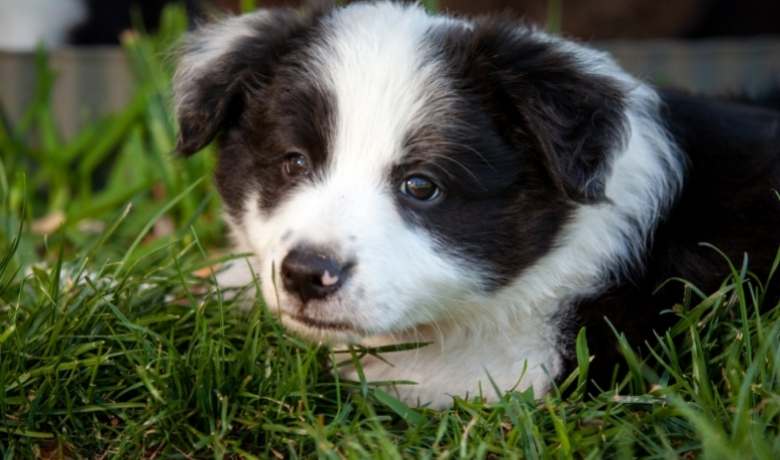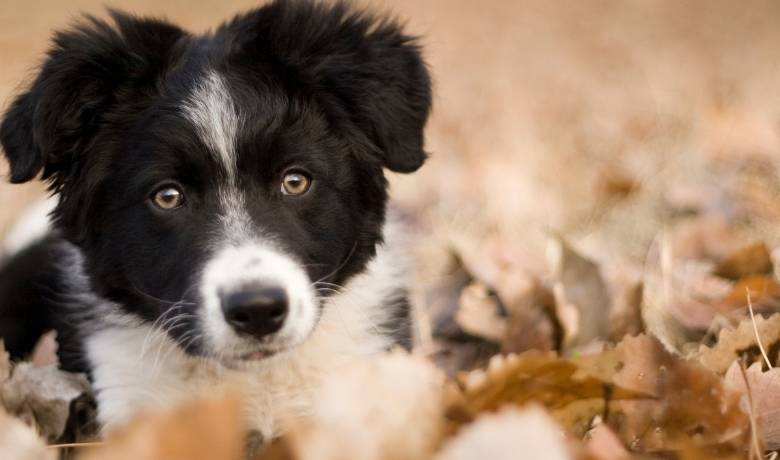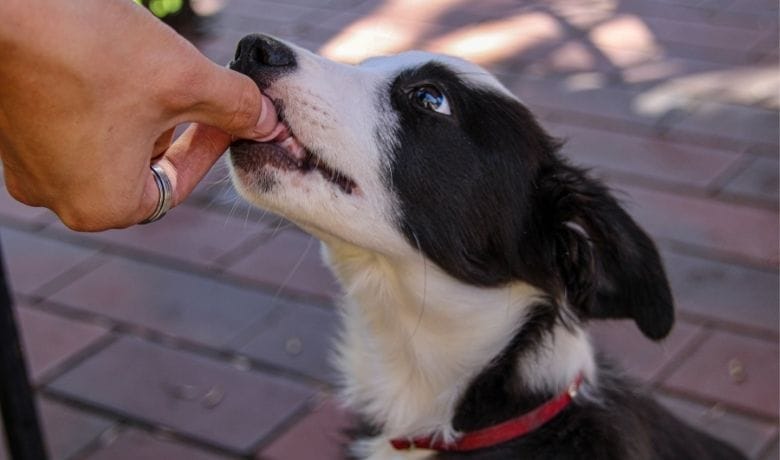The Border Collie is one of the most intelligent breeds with boundless energy levels, especially as a puppy! They are highly trainable and eager to please, so they do well with positive reinforcement. But what age should we train collie puppies? What voice commands are best to start with? And can I train an older Border Collie puppy? In this article we set out to answer some of these important questions.
Border Collie puppy training – what age and which commands? 12- 16 weeks (3-4 months) of age is the best time to start formal puppy training in Border Collies. The three most important commands your collie should know before their first birthday are: i) ‘Come’ or ‘Here’; ii) ‘Place’ or ‘Bed’ and iii) ‘No’ (stop whatever they are doing!).
This extremely energetic breed requires lots of daily exercise and mental stimulation and they are most happy when they have a job or task to do – whether it is chasing squirrels, rummaging in the undergrowth or digging for treats! Training from an early age serves an important role to feed their developing brains and to be able to channel their energy in the safest way and avoid deviant behavior!
How Old Should A Border Collie Be To Train?
First, congratulations on your new puppy! I’m sure he or she will make an excellent companion and bring you joy for many years to come. And second, welcome to the world of dog ownership… where there is a learning opportunity around every corner. Training a puppy is rewarding, but also fun (and often funny) at the same time. at the same time, plenty of patience and a consistent approach will be needed!
There are right and wrong times to begin training your puppy. If you start too early, your dog will tire out before you finish; if you wait too long, you will need to backtrack and teach new behaviors. So when is the right time to start formal training? 12-16 weeks (3-4 months) of age is generally the best time to start formal puppy training in Border Collies.
After four months old you can join a training class after they have been fully vaccinated – a professional trainer certainly has it’s advantages. This allows Border Collies to get their natural socialization that occurs between four and eight weeks of age while staying well ahead of all the negative behaviors that come with adolescence (which is four to seven months for dogs).
Once your puppy reaches six months of age, he becomes less attentive to others and his own environment (ears prick up less often, eyes glaze over) and more interested in his role in the pack (you as one of the pack leaders). This is also when you will see many of the unwanted behaviors that were present with your pup at three to five months of age.
Training after six months of age is still beneficial as they will need ongoing mental stimulation, but not nearly as fun and easy… so making it a priority is key!

Commands For Your Border Collie Puppy
Puppies can learn just about any command you see fit for them to know, but there are a few that I would recommend teaching first. The list below represents the hierarchy of dog training. Simply put, these are the most important commands your dog should know before his first birthday:
· ‘Come’ – preferably with a verbal cue such as ‘here’.
· ‘Place’ – go to your bed and stay there
· ‘No’ – stop whatever it is you’re doing
Following these commands will give you control of your puppy in any given situation. This ability is vital when you want to teach more advanced behaviors like sitting at the curb while waiting for the school bus or not chasing deer on walks (puppies chase everything, especially if excited).
It’s important that whatever words you use with your puppy are consistent. This means never saying “no” as a command since your pup will always be looking to you for guidance. You’ll see many trainers refer to this behavior as “opposite training,” which is the use of a word that has a completely different meaning than its typical context.
How Do I Teach My Puppy These Behaviors?
Basic training is a simple process of shaping behavior by breaking down all the steps necessary to perform a behavior and rewarding your pup for doing each step along the way. We will run through one quick example and the steps to follow here.
Desired Behavior: Teach your puppy how to walk on a leash without pulling.
Steps to Achieve Desired Behavior:
Step 1: Demonstrate
Simply attach your pup’s leash and wait for him to sit or standstill.
Step 2: Acknowledge and record the behavior
Once he does this, mark the behavior with either a word or a clicker. Then, while he is still in the sitting position, give him some small bits of food until he starts to walk forward on his own accord.
Step 3: Positive Reinforcement (Reward!)
Mark this moment and then immediately follow it with one treat after another until your pup walks for several steps without pulling on the leash. This way, your dog begins to understand that they get rewarded for performing the behavior.
Step 4: Habituation (Reduce Rewards)
Once your pup shows a willingness to move from sitting to walking, you can begin to give less food at each subsequent step. The behavior will start to become habit and ingrained in your puppy, so that constant rewarding will not be needed any longer. The treats can then be reserved for training new behaviors… or just when you feel like it!
No matter what age or breed your puppy is, this process is the same for all dogs.

Border Collie Puppy Training Timeline
The Border Collie basic training timeline is very similar to the timeline for other breeds, but it is important that you never forget that your pup is a herding dog. This means he thinks differently than most dogs and will require more patience when training… especially when it comes time to stop his attention fixations!
The timeline below highlights the key behaviors that you can work with your pups on during their first eight weeks at their home. For each behavior, you should train at least twice daily until your Border Collie puppy has mastered the step. You could have a training session in the morning before breakfast and another training session again in the evening after dinner (or whatever two times per day work best for your schedule).
2-5 Months: Basic Commands
Start teaching your new puppy his name by saying it when you feed them, play with them or bring them inside after being outside as this will help with recall training later on. At this stage of obedience and basic house training, it is also important to get family dogs used to their surroundings such as taking them on walks in different areas so they get used to the sound of traffic or walking in a busy area. As well as familiarizing your Border Collie with their surroundings it will allow you to spend some quality bonding time with your additional family member as a strong bond will help in activities for training.
5-7 Months: Letting Go Of Annoying Habits
This is the hardest timeline to follow because almost all dogs are different. At this stage, it is important to reinforce positive habits which can help reduce any bad behavior. For some dogs, their destructive chewing phase will end right about the time they’re ready to leave their mom, for others, it might be closer to 9 months. For this training, the ‘drop it’ command can be given to stop your Border Collie puppy from chewing something they shouldn’t such as an item of clothing or a shoe. Other bad habits such as jumping up on people especially when they are excited or out in the yard will also be stopped through consistent training on a daily basis.
You really need to go by your Border Collies personality here. If they already have good habits you can teach them new ones without too much work. But if they need some help with things like chewing and barking, don’t give up… keep working with them until they stop completely.
7-9 Months: When Puppies Become Adults
During this timeframe, the ‘teenager’ in your pup will start to show itself. He might get snippy during feeding time, try to give you the cold shoulder, or want to be left alone. He’s testing his boundaries and seeing what he can get away with -through correct training techniques this kind of behavior, it’ll go away quickly.
Your Border Collie might still have a potty training accident here and there, but for the most part, they should be pretty reliable by now. If not, just keep working with them using positive reinforcement until they get it right! It is important to remember that this can take a bit longer for puppies who are adopted later in life… so try your best not to get discouraged and stay consistent.
10-12 Months: The Adult Dog
Your adult dog should still be eager to learn new things. They are more interested in playing with you and his dog buddies than finding trouble, so they shouldn’t need much correction from you at all! Just keep up a steady routine of training exercises every day and your pup will do just fine.
The timeline above represents the foundation of all basic obedience training for Border Collies (and other breeds). Once your pup has mastered these, he is ready to move on faster and more advanced training for tricks, sports, and herding exercises.
Training An Older Border Collie?
It is important to remember that an older dog already has his personality. Take time to get to know your dog before undertaking any formal training. They will need time to get used to their new surroundings and family by spending quality time together. This will help to promote correct behavior and discourage destructive behaviors that can occur when a dog feels bored or frustrated.
A timeline is the best place to start with an older dog because you can set goals and know what each task should look like at a certain age. But remember to always be realistic as the most important thing is that you and your dog feel safe and enjoy time together.
But first things first: Keep it fun! You want your dog to learn and enjoy his training sessions, so don’t push him hard before he’s ready. Make sure he has plenty of time to play with other dogs as well. It’s important for all dogs to keep up their social skills as they get older. Further research to teach old dogs new tricks!
